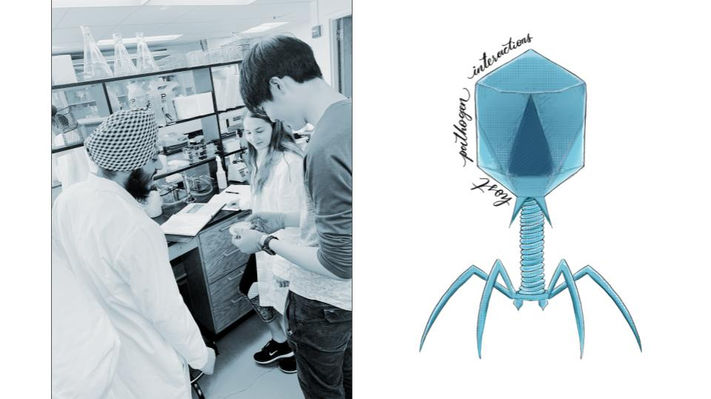
microbiology, virology, biochemistry, molecular biology, genetics
WHAT WE DO
Key Points:
-
Investigate the dynamics of viral replication
Detailed Description:
Intracellular pathogens need to manipulate the host cell environment in order to maximize conditions favorable to drive their own replication. This often includes hijacking host cell metabolic pathways to scavenge essential resources. High-throughput techniques like those employed in metabolomics are just beginning to allow this complex interplay to be investigated, leading to the identification of new therapeutic targets.
This stream is focused on better understanding the cellular changes induced during viral infection using the well-established model organisms of Escherichia coli and bacteriophage. Students investigate critical host-pathogen interactions to better understand the mechanisms employed by both the pathogen and the host to ensure their survival.
WHY IT MATTERS
Key Points:
-
Identifying novel antiviral targets
-
Combating antibiotic resistance
Detailed Description:
With the alarming rise of antibiotic-resistant bacteria, scientists are revisiting the potential of bacteriophage therapy as a way to treat drug-resistant bacterial infections. Bacteriophage infect and hijack a bacterial cell in order to drive their own replication and as a result are completely dependent on the host cell to provide the building blocks to generate new virions. Viral manipulation of host cell metabolism is critical for successful replication, however, there is a lack of understanding about this critical host-pathogen interaction, especially for bacteriophage. Better characterization of phage metabolic adaptations could allow for potential improvements in phage therapy. This research could also more broadly be applied to better understanding viral replication in general and help identify novel potential therapeutic targets with big implication for human health.
WHAT YOU LEARN
Key Points:
-
Microbiology laboratory techniques
-
Experimental design
-
Science communication
Detailed Description:
All students will learn the basic techniques required to work in a standard microbiology lab, including sterile transfer and aseptic culture technique, preparation of culture media and plates, spectrophotometry, and bacteriophage preparation, plating, and quantification. The independent research projects undertaken in the FIRE Host-Pathogen Interactions stream involve the genetic manipulation of both the E. coli host cell and different types of bacteriophage, metabolite profiling during infection, and measuring the dynamics of bacterial and viral replication under different conditions.







